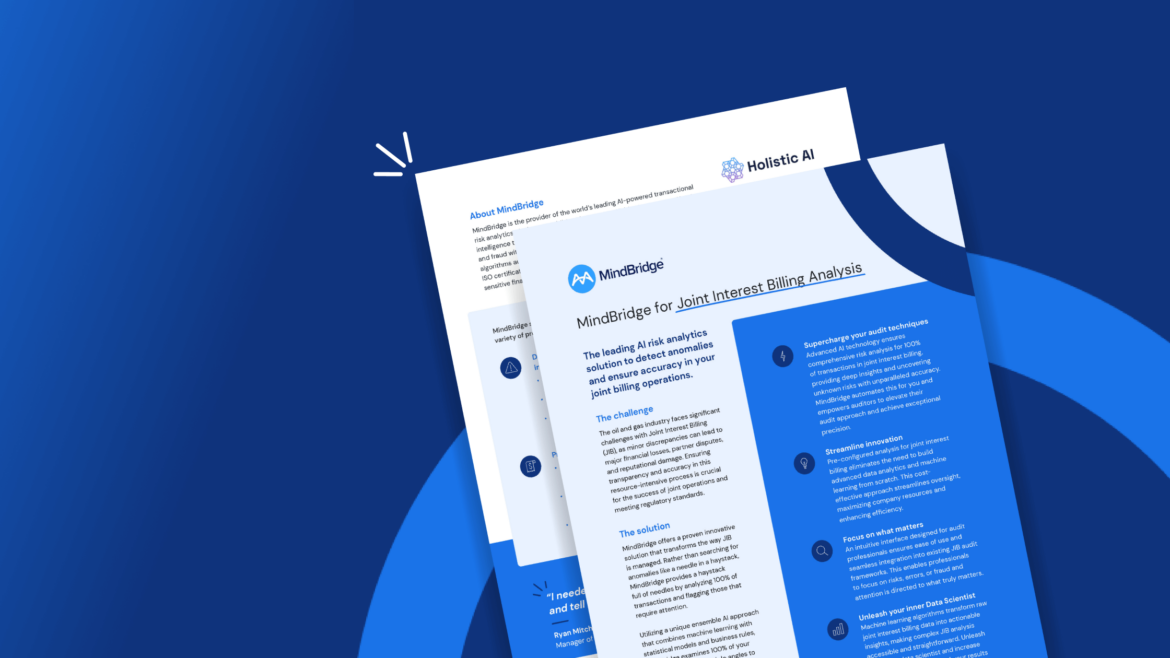Joint Interest Billing (JIB) is fundamental yet complex for financial management in the oil and gas industry. At its core, JIB allows multiple stakeholders—often involved in high-stakes projects such as exploration and production—to share expenses and revenues based on their ownership stakes in a joint venture. This billing practice ensures fair cost distribution but also presents significant challenges, such as charge disputes, cost overruns, and the need for transparent reporting. In this blog, we’ll dive into the mechanics of JIB, common industry challenges, and how AI solutions are transforming the process for oil and gas companies.
What is Joint Interest Billing, and Why Is It Important?
Joint Interest Billing, or JIB, is an accounting practice tailored to industries where partnerships in costly operations are essential. In oil and gas, JIB enables the equitable distribution of project-related expenses—such as production, administrative, and regulatory costs—among venture partners based on their investment share. These ventures may span years, requiring meticulous cost tracking and allocation to avoid misunderstandings or disputes.
Why It Matters: Transparency and accuracy in JIB aren’t just best practices—they are vital for maintaining trust and financial clarity among partners. Errors or misallocations in JIB can lead to strained relationships, potential legal battles, and reputational harm. To avoid these pitfalls, companies must approach JIB with rigorous oversight, which traditionally involves extensive manual entry, verification, and data reconciliation.
Common Challenges in Joint Interest Billing
Managing JIB effectively requires careful navigation of several key challenges. Here are the primary issues that oil and gas companies face:
Charge Disputes and Payment Delays: Complex financial transactions can easily lead to disputes, particularly when they involve multiple partners with varied stakes. The array of costs—from exploration to administrative fees—requires clear and accurate allocation to avoid confusion. If a single expense is misallocated or overlooked, disputes arise, leading to payment delays and potentially straining partner relationships.
Revenue Distribution Verification: Ensuring that revenue is divided accurately among partners is crucial but complex. Distribution errors, often arising from manual processes, can damage trust. Without sufficient transparency, partners may suspect errors are intentional, further complicating relationships.
Cost Overruns: Unplanned expenses or overlooked costs can lead to overruns, which directly impact each partner’s financial commitment. Managing costs in JIB is resource-intensive, requiring thorough verification processes and accurate reporting. If unintentional errors are not detected early, they can result in financial strain and disputes.
Maintaining Transparent Reporting: Transparent reporting is essential to avoid misunderstandings. JIB processes require clear, accessible records that allow all partners to verify charges and revenue distribution. Without it, minor errors can snowball into significant disputes, and partners may lose confidence in the integrity of financial reports.
Why AI is a Game Changer for Joint Interest Billing
Given the complexities of JIB, oil and gas companies are increasingly turning to Artificial Intelligence (AI) to streamline processes, enhance accuracy, and improve transparency. Here’s how AI reshapes the JIB landscape:
Automated Data Analysis: AI-powered solutions can process and analyze vast amounts of financial data quickly and accurately, reducing the need for manual verification. This not only speeds up processes but also minimizes human error, a common source of disputes.
Anomaly Detection: AI algorithms are designed to identify anomalies and irregularities, making it easier for companies to spot discrepancies early. Advanced AI tools, such as those developed by MindBridge, analyze 100% of transactions, which enables more accurate detection of unusual spending patterns and other financial inconsistencies.
Enhanced Accuracy and Predictive Insights: Traditional JIB methods often rely on sampling data, which leaves room for overlooked errors. In contrast, AI solutions can continuously monitor all transactions in real time, providing a complete view of financial activities. AI also offers predictive insights, helping companies anticipate issues before they arise, which is invaluable for maintaining smooth operations and proactive risk management.
MindBridge’s AI-Powered Solution for Joint Interest Billing
MindBridge’s AI-powered financial risk software is designed to address JIB-specific challenges, providing oil and gas companies with tools to streamline billing processes, detect errors, and ensure transparency. Here’s how MindBridge’s platform can enhance your JIB practices:
Anomaly Detection and Financial Accuracy: MindBridge’s platform excels at identifying unusual spending patterns, unexpected transaction combinations, and potential inaccuracies in allocation. By analyzing the entirety of financial data, MindBridge ensures accurate allocations based on ownership percentages, reducing the chance of disputes.
Continuous Monitoring and Reporting: MindBridge’s AI-driven platform continuously monitors all transactions, providing real-time insights into financial activities. This allows finance teams to spot and address issues immediately, instead of waiting for end-of-month reconciliations. Such timely oversight is crucial in preventing disputes and mitigating financial risks.
Automated Verification of Revenue Distribution: With MindBridge, companies can automate the verification process, ensuring that revenue distribution aligns precisely with each partner’s share. By reducing the need for manual audits, MindBridge’s platform fosters greater transparency and trust among partners.
Enhanced Collaboration and Communication: MindBridge provides a centralized platform for audit and finance professionals to communicate and share insights, making it easier to discuss findings, address potential risks, and improve overall transparency. This collaboration is especially valuable for large projects involving multiple partners, as it ensures that everyone is on the same page.
Best Practices for Implementing AI in Joint Interest Billing
For companies considering AI adoption for JIB, here are some best practices to ensure a smooth transition and optimal results:
- Invest in training: Ensure your team is well-trained to use AI tools and interpret the results.
- Focus on integration: Select AI solutions that can seamlessly integrate with your existing systems.
- Monitor and adjust: Continuously monitor AI performance and make adjustments to optimize results.
MindBridge supports these practices by offering comprehensive training, seamless integration, and robust monitoring tools to ensure your AI implementation is successful and continuously optimized.
Looking Ahead: A Proactive Approach to JIB with AI
Adopting AI for JIB transforms it from a labor-intensive, reactive process to a proactive, streamlined function. AI-driven platforms, like MindBridge’s, improve the accuracy of financial reporting and provide tools to address risks continuously, creating a solid foundation for fair and efficient joint ventures.
With automated anomaly detection, real-time monitoring, and enhanced transparency, companies can foster stronger relationships with partners while ensuring financial integrity. AI has the potential to redefine JIB, helping oil and gas companies navigate the complexities of joint ventures with confidence and efficiency.
Take the Next Step in Transforming Your JIB Process
MindBridge’s AI-powered solutions bring unparalleled accuracy, efficiency, and transparency to JIB processes. Want to dive deeper into simplifying JIB processes? Read our step-by-step guide to see how AI can transform your Joint Interest Billing workflows.
About MindBridge
MindBridge is the pioneer and world’s leading AI-powered transactional risk analytics platform. Established in 2015, MindBridge leverages artificial intelligence to analyze entire financial data sets, uncovering risks, errors, and fraud within organizations. As the first AI company to have its algorithms audited by Holistic AI, alongside SOC 2 Type 2 audits and various ISO certifications, we ensure unparalleled trust and confidence in handling sensitive financial data.



